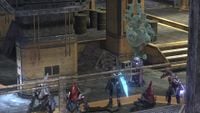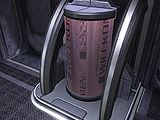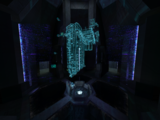Holography
From Halopedia, the Halo wiki
Template:Ratings Template:SeeWikipedia
Holography is a technological system employed by the UNSC, the Covenant and the Forerunners in a variety of functions - communications, battle and sensor displays, and as distractions and decoys. Devices used to project holograms are commonly referred to as Holotanks.
Overview
Holography was invented in 1947 by Hungarian physicist Dennis Gabor (1900–1979), work for which he received the Nobel Prize in physics in 1971. It was made possible by pioneering work in the field of physics by other scientists like Mieczysław Wolfke who resolved technical issues that previously made advancements impossible. The discovery was an unexpected result of research into improving electron microscopes at the British Thomson-Houston Company in Rugby, England. The British Thomson-Houston company filed a patent on 1947-12-17 (and received patent GB685286), but the field did not really advance until the development of the laser in 1960.
The first holograms that recorded 3D objects were made by Yuri Denisyuk in the Soviet Union in 1962; later by Emmett Leith and Juris Upatnieks in University of Michigan, USA in 1962. Advances in photochemical processing techniques, to produce high-quality display holograms were achieved by Nicholas J. Phillips.
Several types of holograms can be made. Transmission holograms, such as those produced by Leith and Upatnieks, are viewed by shining laser light through them and looking at the reconstructed image from the side of the hologram opposite the source. A later refinement, the "rainbow transmission" hologram allows more convenient illumination by white light rather than by lasers or other monochromatic sources. Rainbow holograms are commonly seen today on credit cards as a security feature and on product packaging. These versions of the rainbow transmission hologram are commonly formed as surface relief patterns in a plastic film, and they incorporate a reflective aluminum coating which provides the light from "behind" to reconstruct their imagery.
Another kind of common hologram, the reflection or Denisyuk hologram, is capable of multicolor image reproduction using a white light illumination source on the same side of the hologram as the viewer.
What is generally, and incorrectly, referred to as a hologram in most science fiction, including the Halo series, is actually a Volumetric Display. true holograms are not three-dimensional images. More specifically, Halo "holograms" seem to be of the Static Volume type, creating an actual three-dimensional image rather than creating the illusion of it.[1]
UNSC
The UNSC uses holographic technology in a variety of ways. Artificial Intelligences, such as Cortana, project holographic representations of themselves for personal communications with humans, with each AI taking a unique appearance of their own choice. The UNSC also uses holograms for communications between individual humans. The commanding officer of one ship may "appear" on another to deliver a message when normally access between the two vessels is restricted. Also, holographic technology is used by the UNSC to project topographical maps for tactical purposes. Many UNSC warships, such as the UNSC Spirit of Fire and the UNSC Say My Name had holographic tables. Humans also use holographic technology to display holographic "photographs", referred to as Holo-Stills. Holographic tape known as "Holo-Tape" is used to display information on the sides of civilian vehicles.[2]

Covenant
The Covenant's holographic technology is also based primarily on that of the Forerunners, and though superior to UNSC technology it still pales in comparison. Covenant often utilize stationary Holotanks much like the UNSC, but also portable projectors referred to as Holo-Pedestals. The Covenant use holograms for visual displays of space and ground combat, allowing a better general view of the action and better coordination.[3] Holograms are also used as decoys, through devices known as Holo-Drones, able to generate their own shields and weapons to give the illusion of reality. One of these was used by the Heretic Leader before his death at the hands of the Arbiter.[4] As shown by the ability of Holo-Drones to use weaponry, certain Covenant holograms are somehow capable of physically interacting with their environment. The Prophets, in particular, make extensive use of holography in their governance of the Covenant. Religious sermons, such as those by the Prophet of Truth[5] and Prophet of Regret[6], are transmitted holographically, allowing the Prophets to preach from the relative safety of their point of transmission while protected by armed guards.
Forerunners
Though now extinct, the Forerunners were true masters of holography. Their projections were accurate far beyond UNSC or even Covenant capabilities, able to appear as solid and actual objects. Holograms were used on Alpha Halo for a visible representation of the ringworld, and on the Ark for each of the Halo's and for a visual demonstration by 343 Guilty Spark on the Halo Array's capabilities. It is also notable to mention that many of the Forerunner terminals and nodes that can be activated, particularly in Halo 3, as holograms, yet apparently feel solid and can be pressed by the Master Chief. This could just be him passing his hand over the hologram, but in-game he appears to actually touch them. This is likely, as the Forerunner have proven their capability to produce 'Hard Light' holograms; the barriers in Halo Wars, the multiple light bridges and barriers (Energy Bridge, Barrier Tower) that have appeared throughout the series.
The Forerunner ruins underneath CASTLE Base, despite eons of neglect, were still capable of projecting myriad environments from hundreds of worlds, likely a representation of former Forerunner colonies.
Gallery
- 1220655526 Hologram2.jpg
A Covenant Holo-Drone, used to project holographic illusions, or to communicate over distance.
A holographic sign showing the word "welcome" in different languages on the Quito Space Tether's orbital station.
A holographic map of the Silent Cartographer.
Sources
- ^ Wikipedia's article on Holography
- ^ Halo: Contact Harvest, Chapter 5, page 77
- ^ In the background on the Shadow of Intent
- ^ Halo 2 level The Heretic
- ^ Halo 3 levels Tsavo Highway, The Storm, The Ark and The Covenant
- ^ Halo 2, levels Delta Halo and Regret


